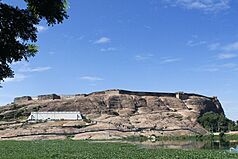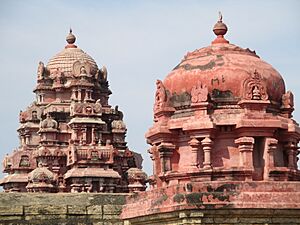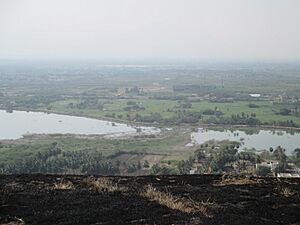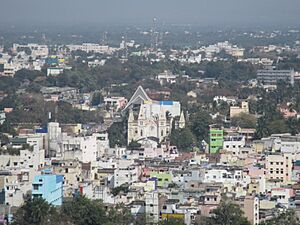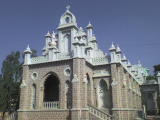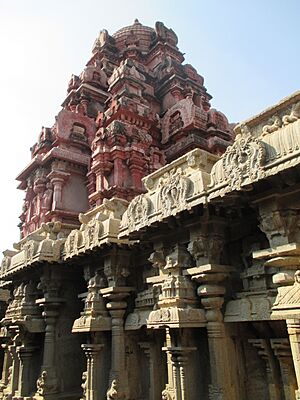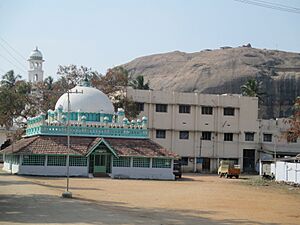Dindigul facts for kids
Quick facts for kids
Dindigul
Thindukkal
|
|
|---|---|
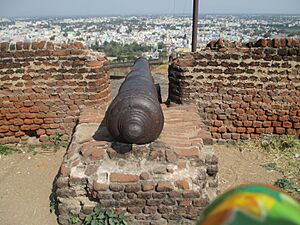
Dindigul viewed from Dindigul Fort
|
|
| Country | |
| State | |
| District | Dindigul |
| Government | |
| • Type | Municipal Corporation |
| • Body | Dindigul City Municipal Corporation |
| Area | |
| • Total | 46.9 km2 (18.1 sq mi) |
| Elevation | 268 m (879 ft) |
| Population
(2011)
|
|
| • Total | 207,327 |
| • Rank | 12 |
| Demonym(s) | Dindigulite |
| Languages | |
| • Official | Tamil |
| Time zone | UTC+05:30 (IST) |
| PIN |
624001
|
| Telephone code | +91-451 |
| Vehicle registration | TN-57/TN-94 |
| Website | Dindigul Municipal Corporation |
Dindigul is a city in the Indian state of Tamil Nadu. It is the main office for the Dindigul district. Dindigul is about 420 km (260 mi) southwest of Chennai, the state capital. It is also 100 km (62 mi) from Tiruchirappalli and 66 km (41 mi) from Madurai. The city is famous for its special locks and a delicious rice dish called biryani.
Dindigul became a Municipal Corporation on February 19, 2014. This means it gained more power to manage its own city services.
Dindigul is a very old city with a long history. It has been ruled by many different groups over time, including the Cheras, Pandyas, Cholas, Pallavas, and later the Vijayanagara Empire and the British. The Dindigul Fort is a very important historical building in the city.
Today, Dindigul has many industries. These include making safety locks, processing leather, spinning textiles, and providing administrative services. Agriculture is also a big part of life here. The city covers an area of 46.9 square kilometers (18.1 sq mi) and had a population of 207,327 people in 2011. Dindigul is well-connected by roads and railways to other parts of Tamil Nadu. It is the 12th largest urban area in the state. The city has a large amount of farmland, and farming is still the main job for many people. Dindigul is located between the Palani and Sirumalai Hills.
Contents
What's in a Name?
The name Dindigul comes from two Tamil words: Thindu meaning "pillow" and kal meaning "rock". This refers to the bare hill in the city that looks like a pillow. An old Tamil poet named Tirunavukkarasar wrote about Dindigul in his work called Tevaram. Another poet, Palupatai sokkanathar, also mentioned Dindigul in his book.
A Glimpse into History
Dindigul's history is mostly about the Dindigul Fort, which sits on a small rocky hill. In ancient times, Dindigul was on the border of three powerful kingdoms: the Pandyas, Cheras, and Cholas. It is believed that the Chera king Dharmabalan built the temples of Abirami and Padmagirinathar. The ancient Tamil book, Silappathikaram, says Dindigul was the northern edge of the Pandya kingdom.
Over the centuries, Dindigul was ruled by many different groups. The Cholas took control in the 1st century CE, and later the Pallavas ruled. By the 16th century, the Nayaks became powerful. In 1605, Muthukrisna Nayakka built the strong hill fort to protect Dindigul from invaders. He also built a fort at the bottom of the hill. Dindigul became very important during the rule of Thirumalai Nayak.
In 1736, Chanda Sahib took control. Later, in 1742, the Mysore army, led by Venkatarayar, conquered Dindigul. The area had 18 small regions called palayams, all under Dindigul. These palayams wanted to be independent. In 1755, Hyder Ali was sent to Dindigul to manage the situation. He later became the ruler of Mysore.
In 1783, the British Army briefly took Dindigul. After some agreements, Dindigul was returned to Mysore. But in 1790, the British, led by James Stewart, conquered Dindigul again. In 1792, Tipu Sultan, Hyder Ali's son, gave Dindigul to the British. This made Dindigul the first area in the Madurai District to be ruled by the British. The British strengthened the fort with cannons. Dindigul remained under British rule until India became independent on August 15, 1947.
Today, Dindigul is growing with new businesses and companies opening branches in the city.
City and Climate
Dindigul is located at 10.35°N 77.95°E and is about 265 meters (869 feet) above sea level. It is at the foot of the Sirumalai hills. The land is mostly flat but also has some hills, which causes changes in the weather.
The summer season in Dindigul is from March to July, with temperatures reaching up to 37°C (99°F). The winter season is from December to January, with temperatures around 20°C (68°F). Dindigul gets about 812 mm (32 inches) of rain each year. Most of the rain comes during the North East monsoon in October, November, and December.
The climate in Dindigul is good for growing different types of flowers and fruits. Besides flowers, Dindigul is known for growing fruits like oranges, pineapples, and guavas. It also grows vegetables like onions, and other crops such as tobacco and coffee.
People and Population
| Religions in Dindigul | ||||
|---|---|---|---|---|
| Religion | Percent(%) | |||
| Hindu | 69.11% | |||
| Christian | 16.59% | |||
| Muslim | 14.17% | |||
| Sikh | 0.02% | |||
| Buddhist | 0.02% | |||
| Jain | 0.01% | |||
| Other | 0.1% | |||
| Historical population | ||
|---|---|---|
| Year | Pop. | ±% |
| 1901 | 25,182 | — |
| 1911 | 25,052 | −0.5% |
| 1921 | 30,922 | +23.4% |
| 1931 | 43,617 | +41.1% |
| 1941 | 56,275 | +29.0% |
| 1951 | 78,361 | +39.2% |
| 1961 | 92,947 | +18.6% |
| 1971 | 128,429 | +38.2% |
| 1981 | 164,103 | +27.8% |
| 1991 | 182,477 | +11.2% |
| 2001 | 196,619 | +7.8% |
| 2011 | 207,327 | +5.4% |
Sources:
|
||
In 2011, Dindigul had a population of 207,327 people. There were slightly more females than males, with 1,012 females for every 1,000 males. About 19,603 children were under the age of six. The city's average literacy rate (people who can read and write) was 81.69%, which is higher than the national average.
Most people in Dindigul are Hindus (69.11%), followed by Christians (16.59%) and Muslims (14.17%). Tamil is the main language spoken, but English is also commonly used, especially in schools and offices.
The houses in Dindigul are built very close together, which helps people feel connected to their community. Many houses are painted in bright colors like yellow, orange, and blue, similar to the colors seen on local temples. This shows how much their religion inspires their daily lives.
Economy and Industries
Dindigul is an important center for jobs in industries and services. About 90% of the workers in the city are in the service sector, which includes things like banking and education.
Dindigul is famous for making locks and steel safes. These locks are sold all over India and even in other countries because of their good quality. In 2019, Dindigul locks received a special "geographical indication" status, like a trademark for products from a specific place. However, the lock industry has seen a decline, while other industries like leather, handloom weaving, and agriculture have become more important.
Dindigul is also known for making silk, muslin, and blankets. After Coimbatore, it has the second largest textile spinning capacity in Tamil Nadu. A special type of silk saree, called Chinnalapatti silk, is made near the city.
The climate is good for farming. Dindigul is a major trading hub for fruits like oranges, pineapples, and guavas, and vegetables like onions.
In the past, Dindigul was a big center for trading tobacco and making cigars during the British times. Even Winston Churchill liked a cigar from Dindigul called the 'Light of Asia'. Today, the tobacco industry is still a main source of jobs. Dindigul is also a leading producer and supplier of leather in the state.
Education and City Services
Dindigul has many schools, including primary, middle, and high schools. There are also engineering colleges and arts and science colleges. Two universities, Gandhigram Rural University and Mother Teresa Women's University, are located in Dindigul.
The Tamil Nadu Electricity Board (TNEB) provides electricity to the city. Water is supplied by the Dindigul Municipal Corporation from several schemes. The city also collects about 92 metric tonnes of solid waste every day, which is then processed by the municipality.
For healthcare, Dindigul has a Government District Headquarters Hospital with 350 beds. There are also several private hospitals and clinics. St. Joseph Mission Hospital is one of the major hospitals in the city.
Getting Around Dindigul
The Dindigul city corporation manages over 131 kilometers (82 mi) of roads. Three national highways pass through Dindigul: NH 44, NH 45A, and NH 83. Another highway, NH 383, connects Dindigul to Karaikudi.
The city has a bus service that connects different parts of the town and nearby areas. Private minibuses also help with local transport. The Kamarajar bus stand is a large bus station in the heart of the city. The Tamil Nadu State Transport Corporation runs daily buses to many cities from Dindigul. Long-distance buses also go to places like Chennai and Bengaluru.
The Dindigul Junction railway station was built in 1875. It is on the main rail line connecting Chennai to Madurai. Many trains going south from Chennai pass through Dindigul. The railway line from Dindigul to Palani was electrified in 2022.
The closest airport is Madurai Airport, which is about 90 km (56 mi) away.
Culture and Traditions
Dindigul is home to many temples, mosques, and churches. The Kalahastheeswara-Gnanambika temple was built in the 14th century. The Abirami Amman and Padmagirinathar temples were repaired in 1538. The rock hill where the fort stands is also called Padmachala or Lotus Hill.
The Dindigul Fort is very famous for its architecture, which has changed over time as different rulers added to it. The rock fort is 900 feet tall and has a circumference of 2.75 kilometers (1.7 mi). Cannons were added to the fort in the 17th century.
People in Dindigul enjoy various forms of art, including visual arts, music, and dance. Classical dance is a popular hobby, and classical vocal music is also common. There are many schools in Dindigul that teach classical music and dance to both children and adults.
Dindigul is especially famous for its biryani. The Dindigul biryani is well-known throughout Tamil Nadu, and Dindigul is sometimes called "Biryani City."
The Sherumalai Mountain nearby is known for a special type of small, sweet banana. These bananas are enjoyed raw and in various snacks. Rice, Sambar, and Rasam are common meals for the people here.
St. Joseph's Church, located in the center of the town, is known for its large size, beautiful architecture, and stained glass art. It was built between 1866 and 1872.
People of Dindigul
The people of Dindigul are known for being very hardworking and friendly. They are proud of their city's culture and traditions. Many people continue to work in traditional family businesses, helping to keep Indian traditions and handicrafts alive.
See also
 In Spanish: Dindigul para niños
In Spanish: Dindigul para niños
 | Jessica Watkins |
 | Robert Henry Lawrence Jr. |
 | Mae Jemison |
 | Sian Proctor |
 | Guion Bluford |




